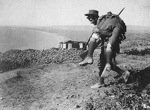“The Story of an Hour” by Kate Chopin (from the “The Seagull Reader”) was a surprisingly interesting short story. The subject matter is a controversial one in any era, so I cant imagine what people thought when it was read in the “spring of 1894” (page 120).
The story begins when Mrs. Mallard is told by her sister and and her husband’s friend, that they have read in the paper her husband was killed in a train accident. Immediately, she is hysterical. As the text puts it “she wept at once, with sudden, wild abandonment, in her sister’s arms,” an excerpt that I thought was extremely powerful (page, 121). The words “wild abandonment” certainly do their job in portraying the heart break of the moment, because they are so strong. We are given a vivid image when Chopin says: “She sat with her head thrown back upon the cushion of the chair, quite motionless, except when a sob came up into her throat and shook her, as a child who has cried itself to sleep continues to sob in its dream” (page 121). I found the authors ability to give a clear image of the scenario extraordinary! As a mother I know exactly what she means about a child crying themselves to sleep.
Next, as Mrs. Mallard retreats to her room she begins to realize just what her husbands death means; which is where we see glints of the underlying feminism in the story. In a time when women were quite frankly enslaved to their husbands, she has been given a unique “get out of jail free card” of sorts. The text explains that ” she was young, with a fair, calm face, whose lines bespoke repression and even a certain strength” (page 121). The repression being that she has been held down or chained by her husband, and the strength hints to the reader that perhaps there is something more to her than just a common house wife. This is then confirmed later when you read that “she abandoned herself a little whispered word escaped her slightly parted lips. She said it over and over under her breath: “free, free, free!” (page 122). Although she loved her husband, or at least as she puts it: “sometimes. Often she had not,” she cant help but feel a growing excitement that she is going to get a chance at a type of freedom women of her era just didn’t get. Though this sounds harsh its not meant to be. She loves her husband, but believes that any marriage is somewhat oppressive. Mrs.Mallard puts it: “kind intention or a cruel intention the act seems no less a crime as she looked upon it in that brief moment of illumination” (page 122). In other words, even the happiest of marriages rob you of your freedom. She has an epiphany type moment as a result of Mr. Mallards death. The fact that she is sitting by an open window seeing an array of lovely things bustling outside, like patches of blue sky and distant songs, is a symbol of the exciting life awaiting her. Its like shes looking out that window into her future, or as the story puts it: ” drinking in a very elixir of life through that open window” (page 122).
I loved the word choice in the excerpt : “she felt it, creeping out of the sky, reaching toward her through the sounds, the scents, the color that filled the air” and “she was striving to beat it back with her will” (page 121). The feelings of grief are strong but the freedom awaiting her makes it difficult for her to help from becoming excited; though she is fighting the them because she feels guilty. I can relate to this right now because I am in the process of moving to Portland. Our moms both live here and are devastated we are leaving, especially because of the grand-kids. However, we are so excited for a new adventure…which can be misunderstood as us being happy we’re leaving our mothers. Mrs. Mallard isn’t happy her husband died, but rather that she is suddenly free to please only herself; which was an unheard of opportunity in her time. She says, “she knows she will weep again when she sees his kind, tender hands folded in death; the face that had never looked save with love upon her, fixed and gray and dead” (page 122). So we know she is upset he has died.
Finally, before leaving her room “she breathed a quick prayer that life might be long. It was only yesterday she had thought with a shudder that light might be long” (page 122). This part was horribly sad in a sense, because to her marriage meant giving up fulfilling your dreams. Then as she comes back downstairs the door opens to her husband standing there. He is unaware of the accident and was actually no where near it. At the sight of him Mrs. Mallard dies of what the doctors say is “of the joy that kills” (page 122). Yet, really it is the sudden loss of complete joy that stops her already trouble afflicted heart.
What a powerful story! So many women in the late 1800’s and early 1900’s probably were surprised by it. But I wonder if their shock was because a women would react to their husband’s death in such a way, or that someone was saying what they all were thinking out loud. This story seems significant to me because it marks the turning point in history when women started to realize that something was off with the way we were being treated; and started to play with the idea of having their own dreams and goals beyond the kitchen and the bedroom.


